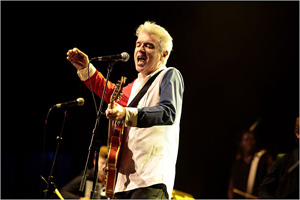
But it was also a setup. Just as the song began to feel indistinct, out crept the soul belter Sharon Jones. “I don’t want to burst your bubbles,” she said, interrupting the singalong. “But listen.” Turning to her band, the Dap-Kings, she issued a brisk command: “Let’s show them our version.” What followed was a tart, emphatic strut, with Ms. Jones exulting in rhythm, and everyone else standing by, obligingly. For much of the preceding three hours, star turns had been better cushioned by group efforts. But in some ways Ms. Jones had the right idea. The concert was a tie-in to “Dark Was the Night” (4AD), the latest in a series of compilation albums made for the Red Hot Organization, an AIDS relief charity. Along with the other titles in the series, going back to 1990, it suggests that artists can sometimes best serve a cause by being themselves. That idea held true here too, if a bit unevenly. Like the album, the show was spearheaded by Aaron and Bryce Dessner of the National, a Brooklyn band that played one of the only underwhelming sets. (Matt Berninger, the National’s front man, couldn’t help sounding pedestrian alongside so many more distinctive singers.) Feist made her appearance feel like a coffeehouse cameo, with solo versions of “The Wagoner’s Lad,” an old folk song, and “Someday Baby,” a recent-vintage Bob Dylan tune. Singing in her warm, flexible voice, she easily held the spotlight by herself. The one exception was “Train Song,” a Vashti Bunyan ballad on which she welcomed Justin Vernon of Bon Iver. In his own set Mr. Vernon began with “Brackett, WI,” one of his two haunting tracks on the album, and moved on to songs either more forceful (“Blood Bank”) or more ethereal (“Big Red Machine”). His falsetto cries were deeply enveloping, especially as harmonized by his band mates. On “Flume,” he delegated a verse to Shara Worden, who handled it well. Ms. Worden, appearing as My Brightest Diamond with backing from the National, struck one of the evening’s high points; her potent take on “Feeling Good” evoked Nina Simone without an ounce of burden. The Dirty Projectors were just as sharp: on a new song, “Stillness Is the Move,” Amber Coffman’s lead vocal landed with a spine-tingling jolt. “Knotty Pine,” the band’s compilation track, had Dave Longstreth wailing in tandem with one of his clear precursors, David Byrne. Mr. Byrne, an avuncular touchstone for the current class of indie rock, was the first artist to agree to a Red Hot album. As he ended the concert’s first half with three tracks he has recorded for the series — all Brazilian-tinged, each from a different release — he enlisted help from Feist, Mr. Vernon and a five-man percussion troupe. His aura was generous but unabashedly exceptional. |





 During the final moments of
During the final moments of